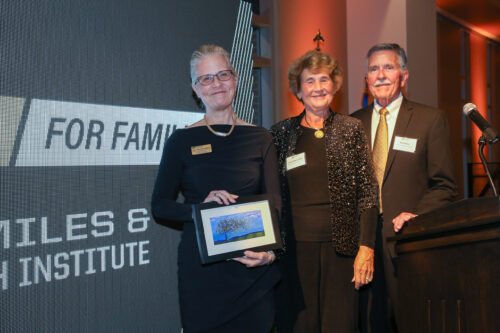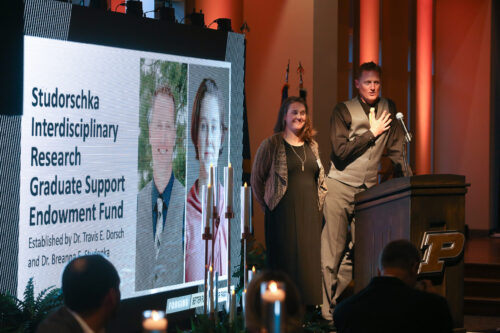Purdue Center for Families shapes policy, discovery to improve family outcomes
Written By: Rebecca Hoffa, rhoffa@purdue.edu

The health and well-being of families is central to the research conducted through Purdue University’s Center for Families. Housed within the College of Health and Human Sciences’ (HHS) Department of Human Development and Family Studies, the center offers a hub where researchers, students and alumni can collaborate to explore a variety of issues surrounding families.
“The idea of family and the work that families do becomes more and more important,” said Shelley MacDermid Wadsworth, professor of human development and family studies and director of the Center for Families. “If families are not able to do the work that societies need them to do, societies cannot function well.”
Small steps to giant leaps

Shelley MacDermid Wadsworth (left) poses with Center for Families donors Joyce and Bob Miles at the Center for Families’ 20th anniversary gala.Photo provided
The center, which was founded in 1994 by donor Lorene Burkhart (HHS ’56) along with other donors and college administrators, focuses on four key audiences to improve outcomes for families: educators, human service professionals, employers and policymakers. From a small beginning 28 years ago, mostly collaborating with HHS Extension, the center has expanded to offer annual educational seminars for Indiana legislators, a student intern program and endowed scholarship, a class and certificate focused on policy, research funding for students and faculty, and much more.
“Families train people about how to be in relationships, how to be good parents and how to be ready for the labor force,” MacDermid Wadsworth said. “There are so many things we rely on them for, and so figuring out how to make it possible for them to do a good job and not get in their way really just gets more important every day. There are a lot of (family-focused) scientific questions to which we don’t yet know the answers that I think it’s very important for the center to continue to promote and pursue.”
Although the center has faculty partners across campus, the center has a particularly close relationship with the Department of Human Development and Family Studies (HDFS), its administrative home and whose work is very closely aligned with the center. Other HDFS faculty members, in addition to MacDermid Wadsworth, also hold leadership positions in the center.
“The faculty in this department, I think, have a really strong commitment to both good science and good engagement, and so they are very in-tune with this idea with trying to shrink the gap between research and practice and also very interested, as is the center, in families’ circumstances, the contexts within which families are operating,” MacDermid Wadsworth said.
Making a difference

Travis Dorsch (right) and his wife, Breanna Studenka (left), address the audience at the Center for Families’ 20th anniversary gala. Photo provided
Starting as a Van Scoyoc Fellowship awardee in the Department of Human Development and Family Studies, HHS alumnus and former Purdue football player Travis Dorsch received funding that helped him pursue his interdisciplinary research dissertation exploring families in sport. Dorsch is now an associate professor at Utah State University, and his work at Purdue has guided his scholarly work throughout his career.
“Families are really important in how young people develop and what contexts they’re exposed to and ultimately the path they choose, good or bad,” Dorsch said. “I became interested then at the end of my playing career in coming back to Purdue and learning more about the developmental side of sport participation and some of those key socializing individuals and their role, particularly parents.”
Dorsch and his wife recently endowed a scholarship to make funding opportunities like what Dorsch received as a graduate student live on in perpetuity. Dorsch also serves on the Center for Families’ advisory council.
“It’s such a beautiful story,” MacDermid Wadsworth said. “He got this little amount of funding. It wasn’t very much money, and now, he and his wife have made it possible for students to receive financial support every year forever. How inspiring is that?”
The bigger picture
One thing that remains central in the Center for Families’ work is not restricting families to a definition but rather to focus on representing all types of families, however they may look.
“One of the things that I think it’s very important always to remember about families is that they are always far more diverse than we generally understand them to be,” MacDermid Wadsworth said. “I hope people can see it as a theme in our work — I never talk about ‘the family’ ever. I never use that term. I always talk about ‘families’ because they are so diverse, and so you have to be thinking about how their needs might be different based on their circumstances.
“Inequalities that happen because policies don’t fit well with the kinds of families that we actually have will always be part of the way that we think about families and try to do science.”
MacDermid Wadsworth noted there are a variety of ways to get involved in the center, whether that may be alumni joining the advisory council or offering financial support; students participating in an internship at the center; or faculty or students applying for funding to engage in interdisciplinary, family-focused research.
“Having a nexus point for that on this campus, I think, is something that can help people do better science and better practice so that they really are addressing the issues that face real families in their real lives,” MacDermid Wadsworth said.
Today, the Center for Families has become its own kind of family to Dorsch when he returns to campus for advisory council meetings. Because of the important work being done, Dorsch noted that the center plays an important role both at Purdue and beyond in shaping research and outreach related to families.
“There are so many questions that fall under the purview of what it is that we do that I think it’s easy to make a case for the Center for Families as being integral to really everything that happens on campus, in the Greater Lafayette area and across the state,” Dorsch said. “We’re really well positioned to be a key stakeholder in state decision-making, policymaking and research.”